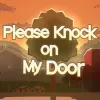Take a look inside 11 images
Please Knock on My Door
Pros: The voice-over narration is very effective at conveying what it's like to have inner thoughts that reinforce self-doubt and to overanalyze everything.
Cons: Can sometimes feel tedious, but that's sort of the point.
Bottom Line: A slow-paced SEL game for helping students understand the nuances of managing mental health.
The content of Please Knock on My Door is perfect for those wishing to include social and emotional learning through games. The simulation of what it's like to suffer from depression for an office worker gives another angle to mental health that other games like Depression Quest do well, adding nuance to help players understand that it manifests in different ways for different people.
Teachers could include Please Knock on My Door as part of a unit on mental health or on telling serious stories and living in other people's shoes through games. Its format is similar to Walden, a game in that each day could be played in separate sessions so that the game lasts a week or two -- since the in-game events last one or two weeks (depending on player choices). Alternatively, if there's time, Please Knock on My Door could be played over a more extended one- or two-hour session. The game really encourages multiple playthroughs, however, so teachers may want to allow students to explore alternate choices during free time or after school.
It's also possible to play this in dyads, forcing students to talk about their choices before making them. They could also be asked to write down their choices in a journal to then share out or write short reflections on each day.
Please Knock on My Door is a (deliberately) slow-paced game about learning to cope (or not) with self-doubt and depression. After quickly adjusting to the disorienting top-down view of the game space depicting the protagonist's apartment, players learn that they must choose how to spend their time during each day over a one- or two-week period. Each day usually is broken down into three parts: a morning routine before going to work at an office job, a series of interstitial text-based events to respond to while at work (where players also see the protagonist's latest diary entry), and an evening routine back at the apartment before going to sleep to start again the next day. Each day, players have to manage hunger and hygiene for a while and then choose how to spend the rest of their leisure time with just a few options: look out a window, play on the computer, watch TV, or take a nap.
Every action takes time and adds or subtracts to a number-based attribute for the protagonist. If this level is high enough, players can also choose to have the protagonist call their father or chat with friends on the internet. The game deliberately doesn't label this protagonist attribute outright. Players could think of it as a mood or wellness level, but it also potentially could be interpreted as the health of the protagonist's inner voice.
Each day and player action is narrated by a voice-over and subtitles with an ambiguous origin, and the voice encourages or discourages the protagonist depending on their mood level. When words appear red, it's a clear sign that self-doubt is starting to creep into the voice. Part of the game is figuring out what the mood level means, where the voice is coming from, and how these two things are related.
In Please Knock on My Door, making positive choices usually means making social choices. Engaging with friends and family keeps spirit levels high, leading to a positive ending that's in stark contrast to the negative endings. Part of learning this game is to learn strategies for how to quantify mood and maintain it through social relationships by trying out different actions and experiencing the negative and positive endings.
In order to learn this most effectively, players should try the game at least two times to see both types of endings. Interestingly, the game also can be played in three different modes: story mode, where any action can be taken at any time; game mode, where point gains and losses due to actions are explicitly displayed; and experience mode, where the mood level is hidden but does limit the choices players can make.
As mentioned, each day is slow going, and after a few of them, the game really feels like it's dragging. As with Depression Quest, where some in-game actions are unavailable if the protagonist's wellness is too low, it's possible to quickly spiral into a hole of self-doubt and loathing without having the ability to climb out of that hole later, making the rest of the days just a terrible slog. This makes the game sound bad, but, in truth, this feeling of hopelessness is deliberate, as Please Knock on My Door is attempting to portray relatively accurately what it's like to succumb to depression and think that one's life is worthless.



















